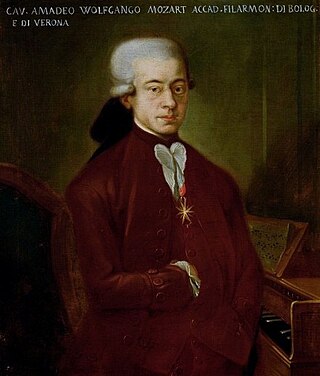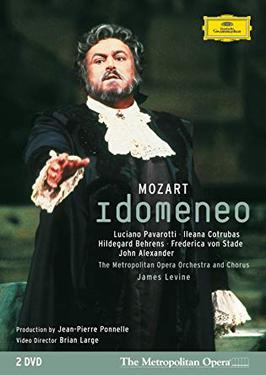
Opera seria is an Italian musical term which refers to the noble and "serious" style of Italian opera that predominated in Europe from the 1710s to about 1770. The term itself was rarely used at the time and only attained common usage once opera seria was becoming unfashionable and beginning to be viewed as something of a historical genre. The popular rival to opera seria was opera buffa, the 'comic' opera that took its cue from the improvisatory commedia dell'arte. An opera seria had a historical or Biblical subject, whereas an opera buffa had a contemporary subject.

Idomeneo, re di Creta ossia Ilia e Idamante is an Italian-language opera seria by Wolfgang Amadeus Mozart. The libretto was adapted by Giambattista Varesco from a French text by Antoine Danchet, based on a 1705 play by Crébillion père, which had been set to music by André Campra as Idoménée in 1712. Mozart and Varesco were commissioned in 1780 by Karl Theodor, Elector of Bavaria for a court carnival. He probably chose the subject, though it may have been Mozart. The work premiered on 29 January 1781 at the Cuvilliés Theatre in Munich, Germany.

L'oca del Cairo is an incomplete Italian opera buffa in three acts, begun by Wolfgang Amadeus Mozart in July 1783 but abandoned in October. The complete libretto by Giambattista Varesco remains. Mozart composed seven of the ten numbers of the first act, plus some recitative, as well a sketch for a further aria; the extant music amounts to about 45 minutes.
Ignaz Jakob Holzbauer was an Austrian composer of symphonies, concertos, operas, and chamber music, and a member of the Mannheim school. His aesthetic style is in line with that of the Sturm und Drang "movement" of German art and literature.

L'Olimpiade is an opera libretto in three acts by Metastasio originally written for an operatic setting by Antonio Caldara of 1733. Metastasio’s plot vaguely draws upon the narrative of "The Trial of the Suitors" provided from Book 6 of The Histories of Herodotus, which had previously been the base for Apostolo Zeno's libretto Gli inganni felici (1695). The story, set in Ancient Greece at the time of the Olympic Games, is about amorous rivalry and characters' taking places to gain the loved one. The story ends with the announcement of two marriages.

Aminta is a play written by Torquato Tasso in 1573, represented during a garden party at the court of Ferrara. Both the actors and the public were noble persons living at the Court, who could understand subtle allusions the poet made to that style of life, in contrast with the life of shepherds, represented in an idyllic way.

Il sogno di Scipione, K. 126, is a dramatic serenade in one act composed by Wolfgang Amadeus Mozart to a libretto by Pietro Metastasio, which is based on the book Somnium Scipionis by Cicero; Metastasio's libretto has been set to music several times. Mozart had originally composed the work at the age of 15 for his patron, Prince-Archbishop Sigismund von Schrattenbach. After the bishop's death before it could be performed, Mozart dedicated it to Schrattenbach's successor, Count Colloredo. It was given a private performance in the Archbishop's Palace in Salzburg on 1 May 1772, although not in its entirety. Only one aria, the final chorus and the recitative dedicating it to the new Prince-Archbishop were performed. It is highly unlikely that it was ever performed in its entirety in Mozart's lifetime.
Father Giambattista Varesco was a chaplain, musician, poet and librettist to Wolfgang Amadeus Mozart. His given name variously appears as Giambattista, Gianbattista, Giovanni Battista and Girolamo Giovanni Battista. He is sometimes referred to with the Italian title Abate or the French Abbé, both used for priests: he was chaplain at the Salzburg court chapel from 1766.

Europa riconosciuta is an opera in two acts by Antonio Salieri, designated as a dramma per musica, set to an Italian libretto by Mattia Verazi.
Domenico Fischietti (1725–1810) was an Italian composer.

"Conservati fedele" is a concert aria for soprano and orchestra by Wolfgang Amadeus Mozart.

Annette Dasch is a German soprano. She performs in operas and concerts.
Antonio Maria Mazzoni was an Italian composer.
Il re pastore is an opera by the composer Christoph Willibald Gluck. It takes the form of a dramma per musica in three acts. The Italian-language libretto is by Pietro Metastasio. The opera premiered on 8 December 1756 at the Burgtheater, Vienna.

Semiramide riconosciuta is a dramma per musica in two acts by Giacomo Meyerbeer. It is the composer's fifth opera and the second that he composed for a theatre in Italy. The text is an adaptation of a pre-existing libretto by Pietro Metastasio that had already been set to music by numerous other composers. The opera had its premiere at the Teatro Regio in Turin on 3 February 1819.
Il re pastore is a 1751 Italian-language opera libretto written by Metastasio. It was first set by Giuseppe Bonno in 1751, but best known today in the version by Gluck (1756) and the Il re pastore of Mozart (1775).

Sophie Karthäuser is a Belgian operatic soprano. She has performed internationally, especially in roles by Mozart such as Ilia in Idomeneo and Pamina in The Magic Flute. She is also a recitalist, performing and recording for example the complete songs by Mozart and lieder by Hugo Wolf.

Idomeneo is a 181-minute television film of the Metropolitan Opera's first staging of Wolfgang Amadeus Mozart's 1781 opera Idomeneo, re di Creta ossia Ilia e Idamante, produced by Jean-Pierre Ponnelle and performed by a cast headed by John Alexander, Hildegard Behrens, Ileana Cotrubaș, Luciano Pavarotti and Frederica von Stade under the direction of James Levine. It was recorded live on 6 November 1982, and telecast live in the United States by the Public Broadcasting Service series Live from the Metropolitan Opera. It has been released on VHS video cassette, Laserdisc and DVD.
Il re pastore is a 1775 opera by Wolfgang Amadeus Mozart.











